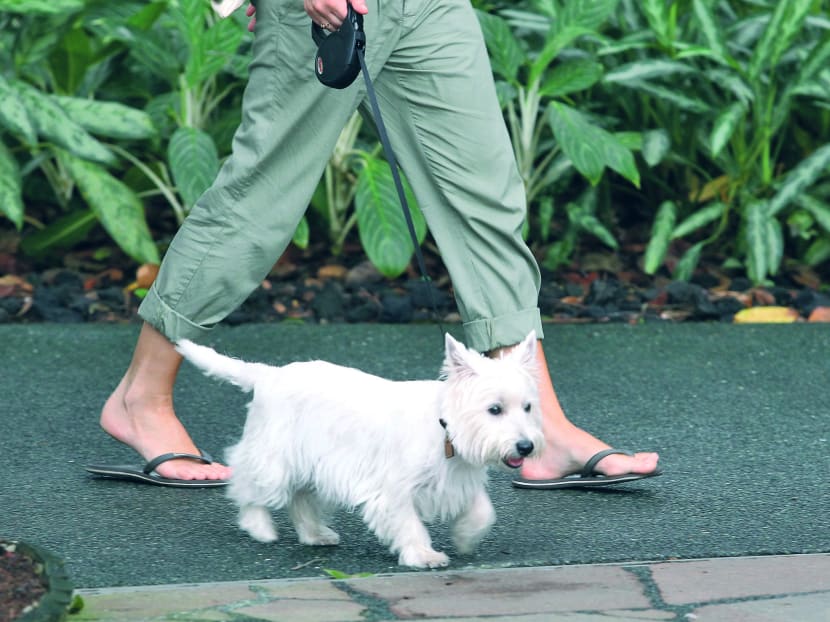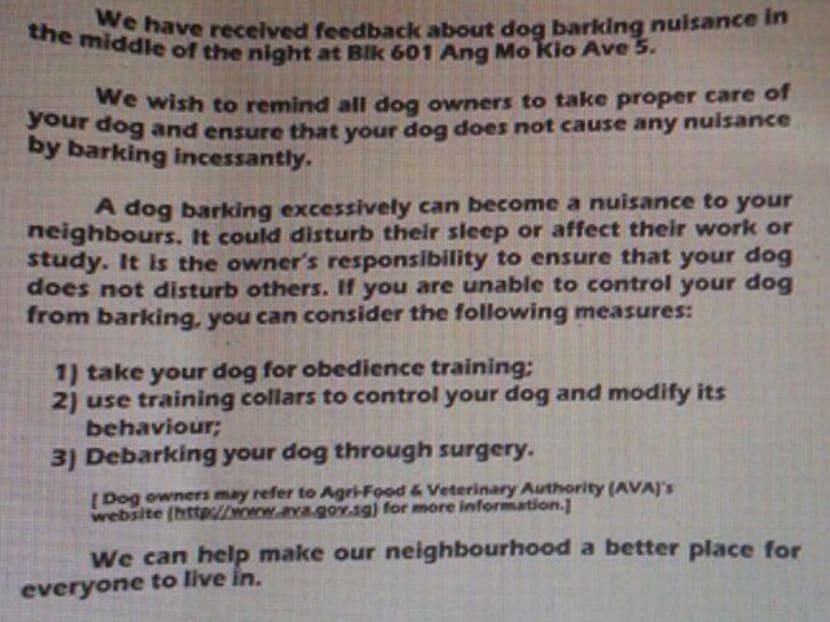HDB suggestion to debark noisy dogs angers animal rights groups
SINGAPORE — A Housing and Development Board (HDB) notice on excessive dog barking that listed the option of surgically debarking dogs as a solution has drawn the ire of animal welfare groups, prompting the agency to take down the notice and apologise.


SINGAPORE — A Housing and Development Board (HDB) notice on excessive dog barking that listed the option of surgically debarking dogs as a solution has drawn the ire of animal welfare groups, prompting the agency to take down the notice and apologise.
The notice, which was posted at a HDB block on Ang Mo Kio Avenue 5, was dated Aug 22. In the notice, the housing authority said it had received feedback about dog barking in the middle of the night. “A dog barking excessively can become a nuisance to your neighbours. It could disturb their sleep or affect their work or study,” the HDB said.
It suggested that dog owners who cannot control their pets from barking consider obedience training, using training collars to control them or debarking, which involves the removal of a dog’s vocal cords through surgery.
A photograph of the notice was posted online yesterday by Action for Singapore Dogs (ASD), which described debarking as an “extremely cruel and painful procedure” that can cause constant physical pain.
“A dog also barks when it is in a stressed or anxious mode, and not hearing the dog does not mean the dog is in a stable state of mind,” it said. “Such recommendations should not be publicly put out without due advice from experts as it sets a wrong mindset that such solutions are ethical or safe.”
In a statement, Society for the Prevention of Cruelty to Animals (SPCA) executive director Corinne Fong said debarking usually leaves the animal “with something between a wheeze and a squeak”. “Many veterinarians refuse to do the surgery on ethical grounds. Those who do rarely advertise it,” she said, adding that the procedure is prohibited in the United Kingdom and in some American states.
Added Dr Heng Yee Ling of Mount Pleasant Vets: “We do not do debarking because there are better and more humane ways to control a dog, such as behaviour training.”
The SPCA also objected to the recommendation to use training collars, which work by delivering electric shocks to the dog to correct behaviour.
In a response to media queries, the HDB apologised for causing anxiety to dog owners. “We agree it should have been handled more sensitively, and the notice has since been taken down,” it said.
It also said the notice did not accurately reflect its position. “When residents complain about excessive dog barking, we have always advised and counselled dog owners to manage their pets’ barking and behaviour through obedience training. Debarking should be considered by pet owners only as a last resort when all other measures, especially training, are ineffective, and only if the owner considers it an option,” it said.
ASD president Ricky Yeo said a framework was needed to ensure that a complaint about incessant barking is substantiated. “People also have to understand that changes will not happen overnight. A certain tolerance level should be accepted,” he said. “There needs to be a certain yardstick that everyone lives by. We all live in a very close area, so we have to learn to accommodate and compromise.”
ADDITIONAL REPORTING BY LAURA PHILOMIN









